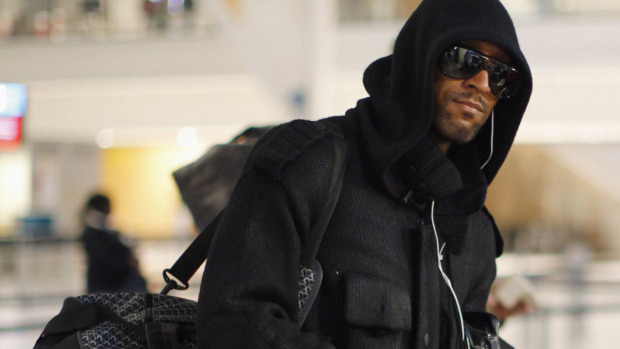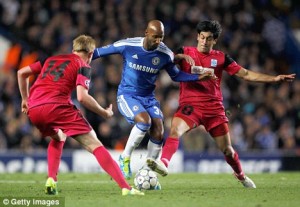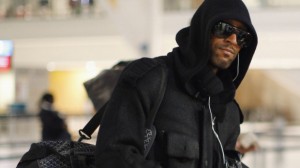Its strange to think that Nicolas Anelka has already been a professional footballer for fifteen years. The Arsenal side he first came to prominence in included the whole of Arsenal’s iconic backline of Lee Dixon, Nigel Winterburn, Tony Adam and Steve Bould for goodness sake.
The Frenchman, over a decade on from his first goal for Arsenal as a seventeen year old (against Manchester United in a 3-2 win, no less), has retained most of his pace and all of his ruthlessness in front of goal. He arrives in Shanghai averaging a goal every three games over a career that up to now, has now taken him to nine clubs in five countries.
Early days
Anelka arrived at his first club, Paris Saint-Germaine after a three year spell at the fabled Clairefontaine sports academy where he boarded with future French internationals Thierry Henry, William Gallas and Louis Saha. Aged 17, the young striker played ten games and scoring one goal before moving onto Arsenal for £500,000 in 1997.
The move to Highbury was controversial as French clubs were obliged under an agreement to not poach their rival’s best youngsters whilst they were still under apprentice contracts. Arsenal, not bound by such an agreement, signalled their intention to sign Anelka, and PSG realising that they didn’t have a strong hand, reluctantly accepted the bid.
Once at Arsenal, still in the early stages of the Arsene Wenger revolution, Anelka found himself being used mainly as a squad player until Ian Wright injured himself in late 1997. Seizing his chance, Anelka formed a potent partnership with Denis Bergkamp, leading Arsenal to a ‘double’ in the 1997-98 Premier League season and earning the Frenchman the PFA Young Player of the year award in the process.
Despite the plaudits, Anelka wasn’t happy with his lot and his brother/agent Claude, sensed a payday and duly hawked his sibling around to Italian side SS Lazio and Real Madrid. The former golden boy eventually moved to Spain in August 1999, signing a seven year contract that would cost Real a cool £22M. By coincidence, Real would then sell Davor Suker to the Gunners for £3.5m and both men would take the other’s no.9 shirt at their new clubs. Tellingly, neither man would last a year at their new destination eithier.
Indeed, the move to Madrid generally marks the start of the Anelka’s nomadic phase as he moved from club to club every couple of seasons. Although he played in Real’s 3-0 win over Valencia in the Champions League final (the one where Steve McManaman did that sort of scuffed bicycle kick for the third goal), Anelka made the fatal mistake of clashing swords with Raul, who promptly had the youngster sold on. The Frenchman returned to PSG in the summer of 2000 for £20m, no doubt still seething from being an unused substitute in France’s 2-1 victory over Italy in the final of Euro 2000.
After two years in Paris, the Frenchmen returned to England, this time on loan with Liverpool in 2002 after Robbie Fowler had left for Leeds United. When Gerald Houllier decided not to pick up the bill for Anelka, Kevin Keegan stepped in and Manchester City made the Frenchman their record signing in 2002, handing over £15m for the pleasure. The striker would go on to score thirty-nine goals in eighty-seven appearances for the club.
Fast forward a few years, thirty million pounds in combined transfer fees and spells with Turkish side Fenerbahce (where he won the league in 2005) and Bolton Wanders whereupon Anelka moved to Chelsea for £15m in January, 2008. An FA Cup winner in 2009, Anelka would get his second league and cup double in 2010, becoming the only Premier League player to win a double with different clubs. In addition, he is also one of only three players to have won the Premier League with different clubs (Henning Berg and Ashley Cole are the others).
Rebel without a pause
All of Anelka is moving around paints the picture of a somewhat distant, prickly character that frankly doesn’t care what you think about him. Likewise, he has built up a rap sheet of clashes with coaches, most of whom have been forced to move the player on after their argument. Anelka managed to fall out with Luis Fernandez at PSG and former Real Madrid manager, Vicente Del Bosque suspended the striker for 45 days after the latter refused to train. When he missed the crucial penalty in the 2008 Champions League final, Anelka blamed his Chelsea coach, Avram Grant for not giving him enough time to warm up or actual game time before the shoot out. Most famously, he refused to apologise for calling Raymond Domenech ‘a dirty son of a whore’ after acting as a ring leader during France’s spectacular squad rebellion during the 2010 World Cup, an act that effectively ended Anelka’s international career. One can only imagine what he’d say to Zhu Jun if the Frenchman got riled up in the Honkou dressing room.
Make no mistake, this is a top drawer player who does not suffer fools gladly. Any player with eight league or cup medals from big European leagues deserves respect and in Anelka, Shenhua has a man with a resume of success. What happens when the new poster boy of the Chinese Super League gets here is anyone’s guess but if his past is anything to go by, it will be anything but predictable.



